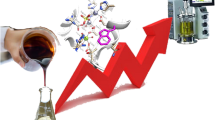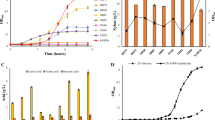Abstract
Bacterial alkaline peptidases, especially from Bacillus species, occupy the frontline in global enzyme market, albeit with poor production economics. Here, we report the deployment of response surface methodology approximations to optimize fermentation parameters for enhanced yield of alkaline peptidase by the non-Bacillus bacterium; Stenotrophomonas acidaminiphila. Shake flask production under optimized conditions was scaled up in a 5-L bench-scale bioreactor. Logistic and modified Gompertz models revealed significant fits for biomass formation, total protein, and substrate consumption models. Maximum specific growth rate (µmax = 0.362 h−1) of the bacterium in the optimized medium did not differ significantly from those in Luria–Bertani and trypticase soy broths. The aqueous two-phase system-purified 45.7 kDa alkaline protease retained 83% activity which improved with increasing sodium dodecyl sulfate concentration thus highlighting potential laundry application. Maximum enzyme activity occurred at 75ºC and pH 10.5 but was inhibited by 5 mM phenyl-methyl-sulfonyl fluoride suggesting a serine-protease nature.





Similar content being viewed by others
Data availability
The datasets generated during and/or analyzed during the current study are available from the corresponding author on reasonable request.
References
Abd Samad NS, Amid A, Jimat DN, Ab Shukor NA (2017) Protease purification from Bacillus amyloliquefaciens B7 using aqueous two-phase system (ATPS). Int Food Res J 24:S292–S297. https://doi.org/10.26480/gws.01.2017.07.09
Adegoke AA, Stenström TA, Okoh AI (2017) Stenotrophomonas maltophilia as an emerging ubiquitous pathogen: looking beyond contemporary antibiotic therapy. Front Microbiol 8:2276. https://doi.org/10.3389/fmicb.2017.02276
Amaral YMS, da Silva OS, de Oliveira RL, Porto TS (2020) Production, extraction, and thermodynamics protease partitioning from Aspergillus tamarii Kita UCP 1279 using PEG/sodium citrate aqueous two-phase system. Prep Biochem Biotechnol 50:619–626. https://doi.org/10.1080/10826068.2020.1721535
Ammasi R, Victor JS, Chellan R, Chellappa M (2020) Alkaline protease for an efficacious rehydration of skin matrix by a novel Bacillus crolab MTCC 5468 in sustainable leather production: a green approach. Biotechnol Lett 42:249–267. https://doi.org/10.1007/s10529-019-02769-0
Asitok AD, Antai SP, Ekpenyong MG (2017) Water soluble fraction of crude oil uncouples protease biosynthesis and activity in hydrocarbonoclastic bacteria: implications for natural attenuation. Int J Sci 6:5–21
Assih EA, Ouattara AS, Thierry S, Cayol J-L, Labat M, Macarie H (2002) Stenotrophomonas acidaminiphila sp. nov., a strictly aerobic bacterium isolated from an upflow anaerobic sludge blanket (UASB) reactor. Int J Syst Evol Microbiol 52:559–568. https://doi.org/10.1099/00207713-52-2-559
Barros FFC, Simiqueli APR, de Andrade CJ, Pastore GM (2013) Production of enzymes from agro-industrial wastes by biosurfactant-producing strains of Bacillus subtilis. Biotechnol Res Int. https://doi.org/10.1155/2013/103960
Bradford MM (1976) A rapid and sensitive method for quantitation of microgram quantities of protein utilizing the principle of protein-dye binding. Anal Biochem 72:248–254. https://doi.org/10.1016/0003-2697(76)90527-3
Brooke JS (2012) Stenotrophomonas maltophila: an emerging global opportunistic pathogen. Clin Microbiol Rev 25:2–41. https://doi.org/10.1128/CMR.00019-11
Chouyyok W, Wongmongkol N, Siwarungson N, Prichanont S (2005) Extraction of alkaline protease using an aqueous two-phase system from cell free Bacillus subtilis TISTR 25 fermentation broth. Process Biochem 40:3514–3518. https://doi.org/10.1016/j.procbio.2005.03.052
de Souza PM, Bittencourt ML, Caprara CC, de Freitas M, de Almeida RP, Silveir D, Fonseca YM, Ferreira Filho EX, Pessoa Junior A, Magalhães PO (2015) A biotechnology perspective of fungal proteases. Braz J Microbiol 46:337–346. https://doi.org/10.1590/S1517-838246220140359
Edet PE, Asitok AD, Ekpenyong MG, Antai SP (2018) Evaluation of the effects of nutritional and environmental parameters on production of extracellular caseinolytic protease by Stenotrophomonas acidaminiphila strain BPE4. Int J Sci 7:70–81. https://doi.org/10.18483/ijSci.1548
Ekpenyong MG, Antai SP, Asitok AD, Ekpo BO (2017) Plackett-Burman design and response surface optimization of medium trace nutrients for glycolipopeptide biosurfactant production. Iran Biomed J 21:249–260. https://doi.org/10.18869/acadpub.ibj.21.4.249
Ekpenyong MG, Asitok AD, Antai SP, Antigha RE, Ogarekpe NM, Antai AS, Ogbuagu UR, Ayara NN (2021a) Kinetic modeling and quasi-economic analysis of fermentative glycolipopeptide biosurfactant production in a medium co-optimized by statistical and neural network approaches. Prep Biochem Biotechnol 51:450–466. https://doi.org/10.1080/10826068.2020.1830414
Ekpenyong MG, Asitok AD, Antai SP, Ekpo BO, Antigha RE, Ogarekpe NM (2021b) Statistical and artificial neural network approaches to modeling and optimization of fermentation conditions for production of a surface/bioactive glyco-lipo-peptide. Int J Pept Res Ther 27:475–495. https://doi.org/10.1007/s10989-020-10094-8
Ekpenyong MG, Asitok AD, Antigha RE, Ogarekpe NM, Ekong US, Asuquo MI, Essien JP, Antai SP (2021c) Bioprocess optimization of nutritional parameters for enhanced anti-leukemic L-asparaginase production by Aspergillus candidus UCCM 00117: a sequential statistical approach. Int J Pept Res Ther 27:1501–1527. https://doi.org/10.1007/s10989-021-10188-x
Ellaiah P, Srinivasulu B, Adinarayana K (2002) A review on microbial alkaline proteases. J Sci Ind Res 61:690–704
Geethu M, Raghu Chandrashekar H, Divyashree MS (2021) Statistical optimization of polyhydroxyalkanoate production in Bacillus endophyticus using sucrose as sole source of carbon. Arch Microbiol 203:5993–6005. https://doi.org/10.1007/s00203-021-02554-6
Ghosh R, Chatterjee S, Mandal NC (2020) Stenotrophomonas. In: Amaresan N, Annapurna K, Senthil-Kumar M, Kumar K, Sankaranarayanan A (eds) Beneficial microbes in agro-ecology: bacteria and fungi. Academic Press, Cambridge, pp 427–442
Gil-Gil T, Martínez JL, Blanco P (2020) Mechanisms of antimicrobial resistance in Stenotrophomonas maltophilia: a review of current knowledge. Expert Rev Anti-Infect Ther 18:335–347. https://doi.org/10.1080/14787210.2020.1730178
Guleria A, Walia A, Chauhan A, Shirkot CK (2016) Purification and characterization of detergent stable alkaline protease from Bacillus amyloliquefaciens SP1 isolated from apple rhizosphere. J Basic Microbiol 56:138–152. https://doi.org/10.1002/jobm.201500341
Gupta R, Beg Q, Lorenz P (2002) Bacterial alkaline proteases: molecular approaches and industrial applications. Appl Microbiol Biotechnol 59:15–32. https://doi.org/10.1007/s00253-002-0975-y
Harish BS, Uppuluri KB (2018) Modeling of growth kinetics for an isolated marine bacterium, Oceanimonas sp. BPMS22 during the production of a trypsin inhibitor. Prep Biochem Biotechnol 48:556–563. https://doi.org/10.1080/10826068.2018.1476878
Iboyo AE, Asitok AD, Ekpenyong MG, Antai SP (2017) Selection of Enterobacter cloacae strain POPE6 for fermentative production of extracellular lipase on palm kernel oil processing effluent. Int J Sci 6:1–17. https://doi.org/10.18483/ijSci.1482
Karray A, Alonazi M, Horchani H, Bacha AB (2021) A novel thermostable and alkaline protease produced from Bacillus stearothermophilus isolated from Olive Oil Mill Sols suitable to industrial biotechnology. Molecules 26:1139. https://doi.org/10.3390/molecules26041139
Laemmli UK (1970) Cleavage of structural protein during the assembly of the head 385 of bacteriophage T4. Nature 227:680–685. https://doi.org/10.1038/227680a0
Lazim H, Mankai H, Slama N, Barkallah I, Limam F (2009) Production and optimization of thermophilic alkaline protease in solid-state fermentation by Streptomyces sp. CN902. J Ind Microbiol Biotechnol 36:531–537. https://doi.org/10.1007/s10295-008-0523-6
Li X, Xu W, Yang J, Zhao H, Xin H, Zhang Y (2016) Effect of different levels of corn steep liquor addition on fermentation characteristics and aerobic stability of fresh rice straw silage. Anim Nutr 2:345–350. https://doi.org/10.1016/j.aninu.2016.09.003
Long J, Zhao X, Liang F, Liu N, Sun Y, Xi Y (2018) Optimization of fermentation conditions for an Escherichia coli strain engineered using the response surface method to produce a novel therapeutic DNA vaccine for rheumatoid arthritis. J Biol Eng 12:22–31. https://doi.org/10.1186/s13036-018-0110-y
Manfredini PG, Cavanhi VAF, Costa JAV, Colla LM (2021) Bioactive peptides and proteases: characteristics, applications and the simultaneous production in solid-state fermentation. Biocatal Biotransform 39:360–377. https://doi.org/10.1080/10242422.2020.1849151
Mangwani N, Shukla SK, Kumari S, Rao TS, Das S (2014) Characterization of Stenotrophomonas acidaminiphila NCW-702 biofilm for implication in the degradation of polycyclic aromatic hydrocarbons. J Appl Microbiol 117:1012–1024. https://doi.org/10.1111/jam.12602
Miller GL (1959) Use of dinitrosalicylic acid reagent for determination of reducing sugar. Anal Chem 31:426–428. https://doi.org/10.1021/ac60147a030
Naveed M, Nadeem F, Mehmood T, Bilal M, Anwar Z, Amjad F (2021) Protease - a versatile and ecofriendly biocatalyst with multi-industrial applications: an updated review. Catal Lett 151:307–323. https://doi.org/10.1007/s10562-020-03316-7
Ozcelik B, Aytar P, Gedikli S, Yardimci E, Caliskan F, Cabuk A (2014) Production of an alkaline protease using Bacillus pumilus D3 without inactivation by SDS, its characterization and purification. J Enzyme Inhib Med Chem 29:388–396. https://doi.org/10.3109/14756366.2013.788503
Rathod MG, Pathak AP (2014) Wealth from waste: optimized alkaline protease production from agro-industrial residues by Bacillus alcalophilus LW8 and its biotechnological applications. J Taibah Univ Sci 8:307–314. https://doi.org/10.1016/j.jtusci.2014.04.002
Razzaq A, Shamsi S, Ali A, Ali Q, Sajjad M, Malik A, Ashraf M (2019) Microbial proteases applications. Front Bioeng Biotechnol 7:110. https://doi.org/10.3389/fbioe.2019.00110
Rodrigues L, Moldes A, Teixeira J, Oliveira R (2006) Kinetic study of fermentative biosurfactant production by Lactobacillus strains. Biochem Eng J 28:109–116. https://doi.org/10.1016/j.bej.2005.06.001
Ryan RP, Monchy S, Cardinale M, Taghavi S (2009) The versatility and adaptation of bacteria from the genus Stenotrophomonas. Nat Rev Microbiol 7:514–525. https://doi.org/10.1038/nrmicro2163
Saggu SK, Mishra PC (2017) Characterization of thermostable alkaline proteases from Bacillus infantis SKS1 isolated from garden soil. PLoS ONE 12:e0188724. https://doi.org/10.1371/journal.pone.0188724
Sarangi BK, Pattanaik DP, Rathinaraj K, Sachindra NM, Madhusudan MC, Mahendrakar NS (2011) Purification of alkaline protease from chicken intestine by aqueous two phase system of polyethylene glycol and sodium citrate. J Food Sci Technol 48:36–44. https://doi.org/10.1007/s13197-010-0137-7
Sattar H, Bibi Z, Kamran A, Aman A, Qader SAU (2019) Degradation of complex casein polymer: Production and optimization of a novel serine metalloprotease from Aspergillus niger KIBGE-IB36. Biocatal Agric Biotechnol 21:101256. https://doi.org/10.1016/j.bcab.2019.101256
Sharma S, Kumar S, Kaur R, Kaur R (2021) Multipotential alkaline protease from a novel Pyxidicoccus sp. 252: ecofriendly replacement to various chemical processes. Front Microbiol 12:722719. https://doi.org/10.3389/fmicb.2021.722719
Singh S, Bajaj BK (2017) Potential application spectrum of microbial proteases for clean and green industrial production. Energy Ecol Environ 2:370–386. https://doi.org/10.1007/s40974-017-0076-5
Solanki P, Putatunda C, Kumar A, Bhatia R, Walia A (2021) Microbial proteases: ubiquitous enzymes with innumerable uses. 3 Biotech 11:428. https://doi.org/10.1007/s13205-021-02928-z
Sulieman AK, Putra MD, Abasaeed AE, Gaily MH, Al-Zahrani SM, Zeinelabdeen MA (2018) Kinetic modeling of the simultaneous production of ethanol and fructose by Saccharomyces cerevisiae. Electron J Biotechnol 34:1–8. https://doi.org/10.1016/j.ejbt.2018.04.006
Tjørve KMC, Tjørve E (2017) The use of Gompertz models in growth analyses, and new Gompertz-model approach: an addition to the Unified-Richards family. PLoS ONE 12:e0178691. https://doi.org/10.1371/journal.pone.0178691
Uniyal S, Paliwal R, Sharma RK, Rai JPN (2016) Degradation of fipronil by Stenotrophomonas acidaminiphila isolated from rhizospheric soil of Zea mays. 3 Biotech 6:48. https://doi.org/10.1007/s13205-015-0354-x
Waghmare SR, Gurav AA, Mali SA, Nadaf NH, Jadhav DB, Sonawane KD (2015) Purification and characterization of novel organic solvent tolerant 98kDa alkaline protease from isolated Stenotrophomonas maltophilia strain SK. Protein Express Purif 107:1–6. https://doi.org/10.1016/j.pep.2014.11.002
Wang Q, Ji F, Wang J, Jiang B, Li L, An L, Li Y, Bao Y (2016) Characterization of a salt-activated protease with temperature-dependent secretion in Stenotrophomonas maltophilia FF11 isolated from frozen Antarctic krill. J Ind Microbiol Biotechnol 43:829–840. https://doi.org/10.1007/s10295-016-1749-3
Wang Y, He T, Shen Z, Wu C (2017) Antimicrobial resistance in Stenotrophomonas spp. Microbiol Spectr. https://doi.org/10.1128/microbiolspec.ARBA-0005-2017
Yang L-Q, Chen G-Y, Li Y, Zhang R-P, Liu S-Q, Sang P (2019) Insight derived from molecular dynamics simulation into dynamics and molecular motions of cuticle-degrading serine protease Ver112. J Biomol Struct Dyn 37:2004–2016. https://doi.org/10.1080/07391102.2018.1471418
Zhou C, Qin H, Chen X, Zhan Y, Xue Y, Ma Y (2018) A novel alkaline protease from alkaliphilic Idiomarina sp. C9–1 with potential application for eco-friendly enzymatic dehairing in the leather industry. Sci Rep 8:1–18. https://doi.org/10.1038/s41598-018-34416-5
Acknowledgements
The technical efforts of Dr. Joseph Ebigwai and his crew of assistants at the Research Laboratory, Calabar are highly appreciated.
Funding
The authors declare that no funds, grants, or other support were received during the preparation of this manuscript.
Author information
Authors and Affiliations
Contributions
[Atim Asitok] conceived and designed the study. Material preparation, data collection and analysis were performed by [Maurice Ekpenyong], [Iquo Takon] [Atim Asitok], [Philomena Edet] and [Richard Antigha]. The first draft of the manuscript was written by [Maurice Ekpenyong], [Nkpa Ogarekpe], [Joseph Essien], [Agnes Antai] and [Sylvester Antai] and all authors commented on previous versions of the manuscript. All authors read and approved the final manuscript.
Corresponding author
Ethics declarations
Conflict of interest
The authors have no relevant financial or non-financial interests to disclose.
Additional information
Communicated by Erko Stackebrandt.
Publisher's Note
Springer Nature remains neutral with regard to jurisdictional claims in published maps and institutional affiliations.
Supplementary Information
Below is the link to the electronic supplementary material.
Rights and permissions
About this article
Cite this article
Asitok, A., Ekpenyong, M., Takon, I. et al. A novel strain of Stenotrophomonas acidaminiphila produces thermostable alkaline peptidase on agro-industrial wastes: process optimization, kinetic modeling and scale-up. Arch Microbiol 204, 400 (2022). https://doi.org/10.1007/s00203-022-03010-9
Received:
Revised:
Accepted:
Published:
DOI: https://doi.org/10.1007/s00203-022-03010-9




